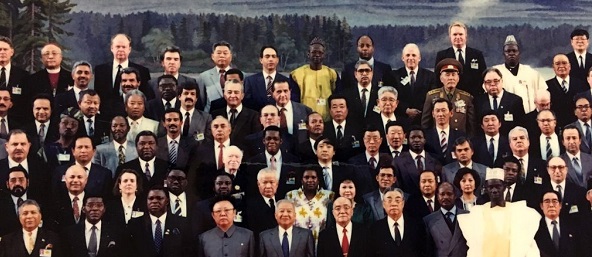Secrecy surrounds North Korean embassy attack
March 31, 2019 | Expert Insights

An attack on a North Korean embassy in Madrid has brought the activities of a fringe activist group to the forefront, although the participation of US intelligence agencies cannot be ruled out.
Background
Following the rule of General Franco, the Kingdom of Spain broke out of its diplomatic isolation, joined the European Union (EU) and the North Atlantic Treaty Organisation (NATO). Spain has established herself as a champion for multilateral activities, with its EU membership providing the basis for the majority of her foreign policy. In all matters, Spain generally prefers to coordinate its efforts with EU partners and multilateral mechanisms.
The Democratic People’s Republic of Korea, also known as North Korea, is viewed as a belligerent state by most international actors, involving itself in a number of illicit activities both domestically and internationally. Of serious concern is North Korea’s nuclear program, which has caused much concentration among world powers. The United States and North Korea are currently engaged in talks over sanctions and North Korea’s nuclear program.
In January of 2014, North Korea opened an embassy in Madrid, Spain. However, North Korea’s continued aggression in regards to its nuclear and missile program led Spain to declare the incumbent North Korean ambassador, Kim Hyok Chol, persona non grata in 2017. North Korean embassies have been associated with the nation’s illicit activities especially those related to narcotics and arms trafficking, while also serving as hubs for kidnappings and cyber attacks.
Analysis
On February 22, 2019, ten assailants allegedly broke into the North Korean embassy in Madrid and conducted a raid. A Spanish National Court judge who recently lifted a confidentiality order on the case said that an investigation had discovered evidence that a “criminal organisation” shackled and gagged embassy staff members while removing computers, hard drives and documents from the premises. The perpetrators specifically urged North Korea’s only Spanish recognised diplomat, So Yun Sok, to defect; the states-person refused.
The perpetrators identified themselves to their hostages as “members of an association or movement of human rights for the liberation of North Korea.” A US official identified the group as the Cheollima Civil Defense, who state as their mission - helping defectors from North Korea. The Spanish judge identified citizenship of the assailants as Mexican, American and South Korean. Naming the Mexican as Adrian Hong Chang, the court said that he flew to the US, contacted the FBI and offered to share the stolen material. The website of the group features a statement that says the event was not an attack and that no one was gagged. However, the group confirms that confidential contact was made with the FBI and some information was shared voluntarily, without “the expectation of any benefit or money in exchange.” The group claims that these terms have been broken by the US official leak. The statement also apologised to Spanish authorities placing them in the “middle of a difficult situation.” The group attempts to frame the incident as a part of the fight against the atrocities committed by Pyongyang, against its own people and around the world.
Spanish authorities have categorically dismissed the notion that amateurs were behind the attack, with sources with knowledge of the investigation stating that the operation was planned perfectly as if to suggest it was carried out by a “military cell.” Reports have suggested that Spanish authorities believe that US intelligence agencies or their allies were involved, with some reports claiming links to the CIA among those identified. Former ambassador to Madrid, Kim Hyok Chol now serves as a key envoy in North Korean talks with the US and even helped organise the recent Hanoi Summit in Vietnam. Little extrapolation is needed to connect to two events as an intelligence gleaning exercise in further talks with the wayward state.
Among tense talks between the US and North Korea, the US cannot afford an intelligence snafu. US officials pointing to a group that claims its participation allows the nation some wiggle room in a potentially embarrassing situation. Conversely, US intelligence agencies may not have been involved in the attack, although the intelligence gleaned by the group was too important to pass over. The leak by US officials may be aimed at creating distance between the event and US intelligence agencies.
Assessment
Our assessment is that while a shroud of secrecy surrounds events at North Korea’s Madrid embassy, it is likely significant intelligence was gleaned from the operation. We believe that the activist group Cheollima Civil Defense was involved in the attack, although it will remain unclear what exactly transpired and if anyone helped them. We believe that it is in the interest of the group to keep any involvement by intelligence agencies a secret in order to continue such operations against the North Korean state.
Image courtesy: https://upload.wikimedia.org/wikipedia/commons/8/8c/80th_Anniversary_Kim_Il-Sung.jpg, Biblioteca del Congreso Nacional [CC BY 3.0 cl (https://creativecommons.org/licenses/by/3.0/cl/deed.en)]








Comments